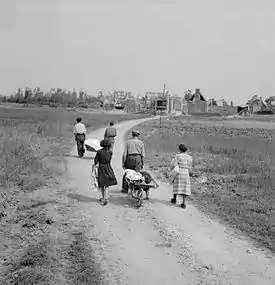Post-war
In Western usage, the phrase post-war era (or postwar era) usually refers to the time since the end of World War II. More broadly, a post-war period (or postwar period) is the interval immediately following the end of a war. A post-war period can become an interwar period or interbellum, when a war between the same parties resumes at a later date (such as the period between World War I and World War II). By contrast, a post-war period marks the cessation of conflict entirely.

Post-war
Chronology of the post–World War II era
The term "post-war" can have different meanings in different countries and refer to a period determined by local considerations based on the effect of the war there.
In Britain, "post-war":
- culturally, is a term commonly used in the arts and architecture, as it is worldwide. It is primarily and especially before the ascendancy of Pop Art and overlapping "post-modernist" "1960s" movements. Its end is complex due to its archetypes of the 1950s contrasting with leading developments in avant-garde music genres and in pop art, becoming to some audiences mainstream, before 1960. Its movements such as continued functionalism and brutalism were overtaken by the, definitively raucous, counterculture of the 1960s, dominating as the decade wore on. Later resurgences to its stress on quite basic forms were common such as postmodernism and minimalism.
- politically and economically
- at its broadest, is the period from the election of Clement Attlee in 1945 to that of Margaret Thatcher in 1979, the so-called post-war consensus.
- at its narrowest, usually with precise or contextual qualifiers, it is the war's direct aftermath; this prompted social solidarity, unprecedented high capital, particularly inheritance taxation, internationalism, the granting of independence to the British Empire, the founding and endowing of the National Health Service all amid relative austerity particularly rationing. Hardships in capital taxation, and of rationing, faded due to global recovery, technological advances and consumerism enabled and encouraged from the late 1950s such as under the four-successive leader Conservative government, 1957–1964. These set a social norm for a majority of out-of-town journeys in private rather than public transport and private housing preferred over public housing, continued (with minor abatement) through alternating governments of the next two decades.[1][2][3]
Cold War era
Considering the post-war era as equivalent to the Cold War era, post-war sometimes includes the 1980s, putting the end at 26 December 1991, with the Dissolution of the Soviet Union.[4][5] The 1990s and the 21st century are extremely rarely described as part of the post-war era.
See also
| Look up post-war in Wiktionary, the free dictionary. |
- Interwar period
- Pre-war (not a synonym for interwar when referring to World War I)
- Aftermath of the September 11 attacks
- Postbellum
- Reconstruction Era of the U.S.
- Post–Cold War era
References
- "AEC Lorries in the post war years 1945-1979 book | #248690820". Worthpoint.
- "The Post-War Years 1945 - 1960".
- The Post War Economy: 1945–1960
- "Archived copy". Archived from the original on 2011-08-22. Retrieved 2011-06-16.CS1 maint: archived copy as title (link)
- "Unknown Forum". soapbox.websitetoolbox.com.